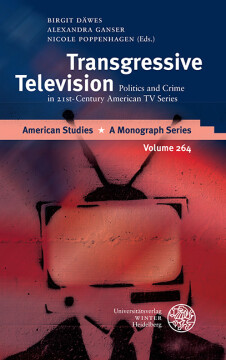
BUCH
Transgressive Television
Politics and Crime in 21st-Century American TV Series
Herausgeber: Däwes, Birgit | Ganser, Alexandra | Poppenhagen, Nicole
American Studies – A Monograph Series, Bd. 264
2015
Zusätzliche Informationen
Bibliografische Daten
Abstract
Since the turn of the 21st century, the landscape of television has decisively changed. Whereas seriality had been part and parcel of television entertainment since the 1940s, the past two decades have witnessed the rise of new technologies and increasingly “complex and elaborate forms” (Jason Mittell), with HBO and Netflix playing leading roles. Particularly in its manifold transgressions of political, social, and ethical boundaries, the contemporary American TV serial serves as both a laboratory for and diagnostic platform of current epistemes and ideological codes. In fifteen interdisciplinary perspectives from the United States and Europe, this volume provides a critical diagnosis of the genre’s politics of gender and ethnicity, difference, normativity and representational control. Contesting the popular term “quality TV,” ‘Transgressive Television’ provides original work on TV Series as diverse as ‘Twin Peaks’, ‘The Sopranos’, ‘Breaking Bad’, ‘The Wire’, ‘House of Cards’, ‘Homeland’, and many others.
Inhaltsverzeichnis
| Zwischenüberschrift | Seite | Aktion | Preis |
|---|---|---|---|
| Cover | C | ||
| Title Page | 3 | ||
| Copyright | 4 | ||
| Table of Contents | 5 | ||
| Birgit DÄWES, Alexandra GANSER, Nicole POPPENHAGEN, Season Recap: A Preface | 9 | ||
| Paving Pathways | 15 | ||
| Birgit DÄWES, Transgressive Television: Preliminary Thoughts | 17 | ||
| Gary R. EDGERTON, The Countdown to Y2KTV and the Arrival of the New Serialists | 33 | ||
| Alexandra GANSER, Transgressive Serialization and the Serialization of Transgression at the U.S.-Canadian Border: Twin Peaks | 55 | ||
| Representing Power: Formats of Political TV Series | 81 | ||
| Marjolaine BOUTET, The Politics of Time in House of Cards | 83 | ||
| Simone PUFF, Another Scandal in Washington: How a Transgressive, Black Anti-Heroine Makes for New “Quality TV” | 103 | ||
| Dorothea WILL, The Humane Face of Politics? Political Representations,Power Structures, and Gender Limitationsin HBO’s Political Comedy Veep | 127 | ||
| Normative Crossings: Institutions, Gender, and Ethnicity | 143 | ||
| Fabius MAYLAND, Institutions and Personal Conceptions of Reality in HBO’s The Wire: Spatial Transgressions and Their Consequences | 145 | ||
| Kimberly R. MOFFITT, The Portrayals of Black Motherhood in The Wire | 165 | ||
| Cornelia KLECKER, “Symbolic Annihilation” and Drive-By Misogyny: Women in Contemporary U.S.-American Television Series | 179 | ||
| René DIETRICH, Secret Spheres from Breaking Bad to The Americans: The Politics of Secrecy, Masculinity, and Transgression in 21st-Century U.S. Television Drama | 195 | ||
| Stephanie SCHOLZ, Cashing In: The ‘Casino Indian’ on Television | 217 | ||
| Transgression and Control: Serializing Crime | 245 | ||
| Karin HOEPKER, No Longer Your Friendly Neighborhood Killer: Crime Shows and Seriality after Dexter | 247 | ||
| Janina ROJEK, Crime, Control, and (Medical) Condition: The Illness Narratives of The Sopranos, Boss, and Breaking Bad as Boundary Transgression | 267 | ||
| Matthew LEROY, Death Art: Representations of Violence in NBC’s Hannibal | 287 | ||
| Felix BRINKER, NBC’s Hannibal and the Politics of Audience Engagement | 303 | ||
| Christoph SCHUBERT, Dexter in Disguise: A Stylistic Approach to Verbal Camouflage in a Serial Killer Series | 329 | ||
| Contributors | 351 |


 Publishing Platform by CloudPublish
Publishing Platform by CloudPublish